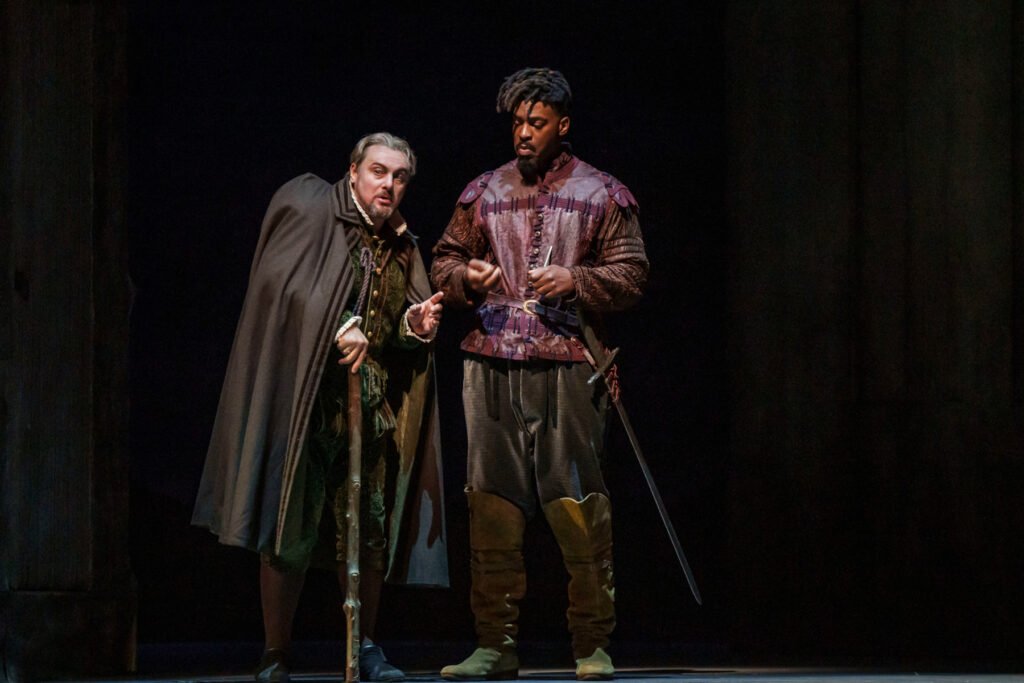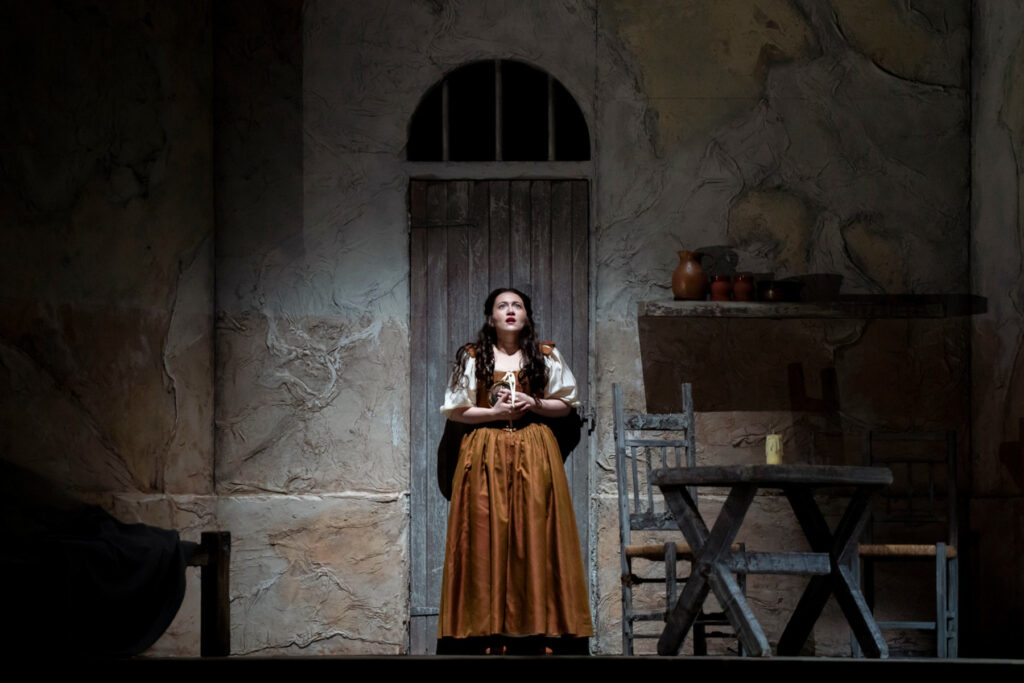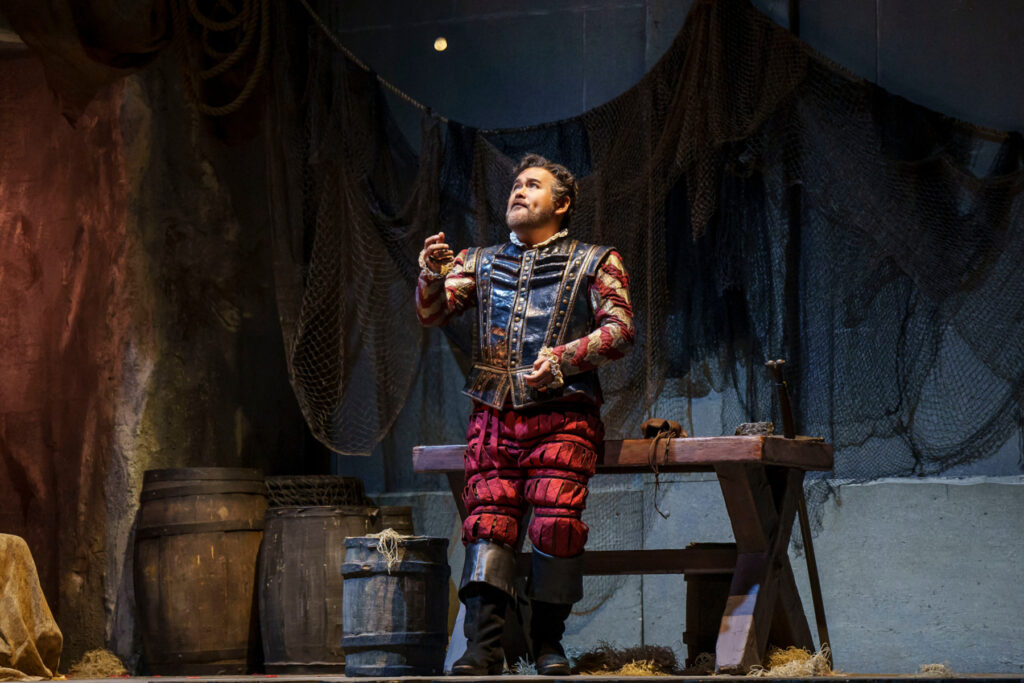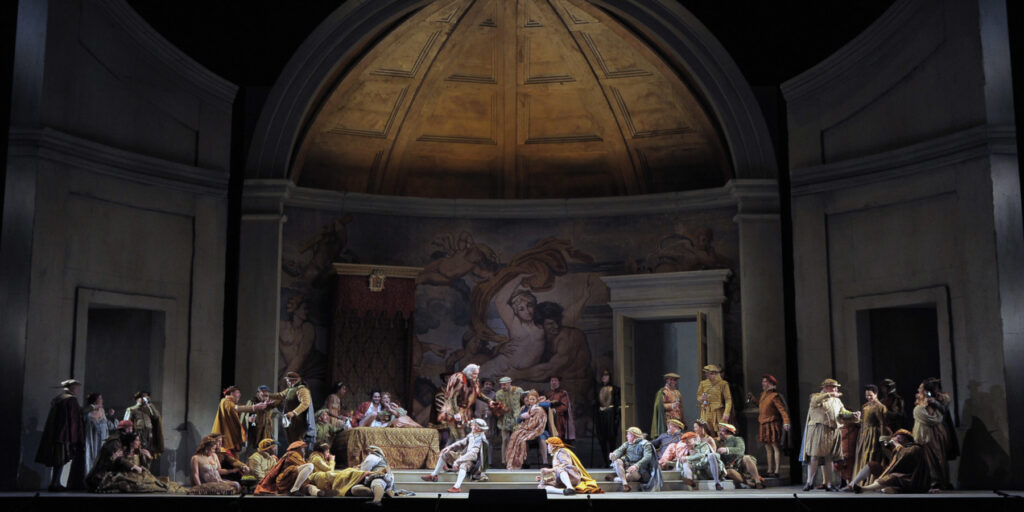Giuseppe Verdi’s Rigoletto tells the story of a small community in which one man’s absolute and arbitrary power eventually corrupts everyone around him. The tragedy is universal: if you find it difficult to identify with Renaissance Mantua, think back to your worst memories of middle school.
Chicago Lyric Opera’s well-cast production conveys the opera’s power and passion as vividly as any I have heard live in recent years. It is worth hearing, even if it ultimately fails to plumb the opera’s musical and dramatic depths.

Of the opera’s triangle of main characters—father, daughter, and seducer—only the jester Rigoletto is genuinely multi-dimensional. Verdi’s model was Shakespeare. For any Verdi baritone, expressing his complex and ambivalent emotions poses a supreme challenge.
The printed program of this Chicago production devotes five pages to large photos of legendary baritones who sang Rigoletto there in the past: Gobbi, Bastianini, MacNeil, Cappuccilli, and Nucci. No modern baritone approaches their warm and smooth vocal production, subtle and emotionally compelling phrasing, and pointed textual delivery.

Still, 44-year-old Russian Igor Golovatenko shows in this production why he is a leading exponent of this role today. At forte, his brassy voice fills a big house—a rare ability these days—and occasionally he scales down to an affecting piano. More often, though, power compensates for nuance: Rigoletto’s anger comes through, paternal tenderness and warmth less so.
The young Armenian soprano Mané Golovan brings to the role of Gilda a duskier full lyric sound than is customary. (Indeed, the voice sounds as if she may eventually move on to dramatic roles.) Yet she also produces the delicate and flexible high coloratura for which this role is best known—notably in the dreamy roulades of “Caro nome.” The overall dramatic result is compelling: less a cardboard cutout canary and more a flesh and blood woman.

Tenor Javier Camarena has a small, brilliant and focused voice, which he occasionally deploys to beautiful effect. In contrast to his celebrated Donizetti and Rossini roles, however, he copes with the slightly heavier role of the Duke of Manua with a harder and more monochromatic tone quality. Lost is the insouciant ease of an aristocrat who fears no one and effortlessly seduces all.
Rapidly rising young American bass Solomon Howard deserves special praise. His polished upper bass brought an unaccustomedly elegance to the assassin Sparafucile. His deepest notes are clear but not yet powerful: basses tend to mature last. If he continues on this path, he may well be headed for the top of the profession.
There is much to like about the exciting, crisp, and fleet Verdi conducting of Chicago Lyric’s Music Director Enrique Mazzola. More flexible tempo changes, subtler instrumental voicing, and a warmer orchestral sound might complete his transition from bel canto specialist, where he began his career, to conductor of red-blooded Verdi. The chorus was solid, albeit wayward in the tricky “Zitti, Zitti.”
For this show, Chicago revived lovely semi-realistic sets. Bolder lighting might have flattered their chiaroscuro style (suggesting de Chirico), but they nonetheless conveyed this opera’s small-town claustrophobia and projected ample sound out into the hall.

Stage Director Mary Birnbaum—a thoughtful and accomplished New York-based opera director, whose work I have enjoyed before—aims to refresh the action. She wants to rethink Gilda not as a doomed innocent in an evil world, but rather as a savvy woman striving for social advancement. Since the libretto and musical score leave little room for significant reinterpretation, however, the change amount to little more than some play with a letter and a red ribbon.
In the last fifteen minutes, however (as another critic has noted) come two inexplicable gaffes. First is restaging Gilda’s stabbing. In lieu of sacrificing herself, here Gilda draws a sword and expertly fights back through the house of a professional swordsman and into the wings. This is absurd on its face: 0perhaps the plucky heroine of a B-grade Disney fantasy film can do this, but a teenager just out of a convent cannot. Worse, we never see the stabbing, a moment of sudden violence skillfully foreshadowed earlier in Sparafucile’s spooky description of his professional skill. With it, we lose sight of the opera’s central theme: in a corrupt world, the strong prey on the weak with remarkable ease.
The second gaffe involves restaging Gilda’s death in the opera’s final minute. Without any sanction from Verdi, Gilda’s dead mother (sporting a pair of 6-foot shiny gold “Angels in America” wings) wanders in from the wings to collect her dying daughter’s soul, whereupon Gilda follows her offstage.
This left the audience to giggle at the absurd sight of Rigoletto exclaiming “É morta!” (“She’s dead!”) while gazing curiously at an apparently undead Gilda. Verdi would have been mortified, since he was essentially atheist and, in his operas of this period, sought to compose soberly realistic operas. Moreover, the faux endingcontradicts Birnbaum’s own premise that Gilda is not a religious naif. Most fundamentally, this distracts from one of the simplest and most effective endings in all opera. Dramatically, the (traditionally) empty stage underscores the irony that Rigoletto’s one effort to preserve family ties leaves him utterly alone with the dead body of his daughter. Musically, Rigoletto’s final sung word “Maledizione!” (“The curse!”), spread over an anguished six-note melisma, is a great moment of Verdi opera that should command our attention.
New and original opera stagings are to be encouraged, but major companies should deputize someone to block such dramatic and musical excesses.
Rigoletto is at the Chicago Lyric Opera until 6 October.
Andrew Moravcsik
Unless otherwise indicated, all photos © Todd Rosenberg Photography.